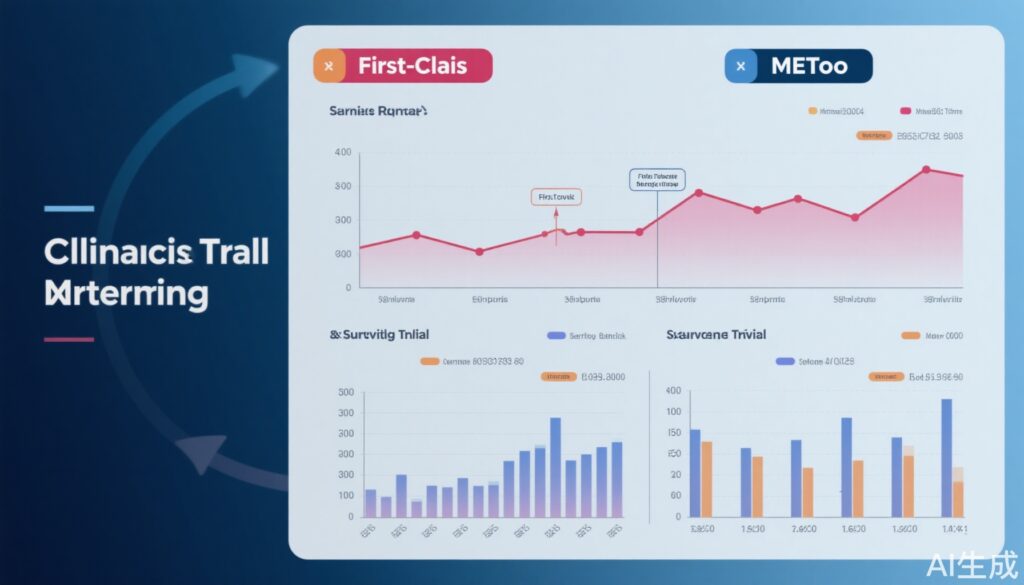Highlight
- Only 29% of FDA-approved next-in-class oncology drugs (me-too drugs) from 2009 to 2020 were evaluated in head-to-head randomized clinical trials (RCTs) against first-in-class agents.
- Among these direct comparisons, only 22% of me-too drugs demonstrated a survival benefit over the original drugs.
- Most trials used progression-free survival as the primary endpoint, with limited emphasis on overall survival.
- There is a pressing need for regulatory incentives to promote within-class RCTs to better assess true therapeutic value.
Clinical Background and Disease Burden
Cancer remains a leading cause of morbidity and mortality worldwide, and the development of new anticancer agents is critical to improving patient outcomes. First-in-class drugs often establish novel therapeutic mechanisms or targets, offering breakthroughs in treatment. Subsequently, next-in-class or “me-too” drugs enter the market, frequently aiming to improve efficacy, safety, or expand indications based on the original agents. However, the relative clinical value of these me-too drugs compared to their predecessors remains uncertain without rigorous comparative evaluation. Given the high costs and potential risks associated with oncology drugs, robust evidence demonstrating meaningful clinical benefit is essential to guide optimal treatment selection and healthcare resource utilization.
Research Methodology
This comprehensive analysis reviewed all 332 FDA approvals for anticancer drugs from 2009 through 2020. Exclusions were applied to supportive care treatments, biosimilars, and drugs with novel administration routes, resulting in a focused dataset of 94 randomized clinical trials (RCTs) evaluating me-too agents. The investigators identified which next-in-class drugs had head-to-head RCTs comparing them with their respective first-in-class drugs, including trials conducted both prior to and following FDA approval.
The primary endpoints of these trials varied: 63% used progression-free survival (PFS), 11% overall survival (OS), and 11% response rate. The majority (77.8%) were superiority trials designed to demonstrate that the me-too drug was superior to the original agent.
Key Findings
Of the 94 RCTs analyzed, only 27 (approximately 29%) directly compared me-too drugs to first-in-class agents, including 23 regular approvals and 4 accelerated approvals. Among these 27 trials, just 12 had published results at the time of FDA approval, with the remaining 15 published post-approval after a median lag of 2.8 years for regular approvals and 3.3 years for accelerated approvals.
Survival benefit, a critical endpoint for oncology therapies, was demonstrated in only 6 of the 27 head-to-head trials (22.2%). Fourteen trials (51.9%) met their non-survival primary endpoints, primarily progression-free survival or response rates, while 6 trials (22.2%) failed to meet their primary endpoints. One trial was ongoing at the time of analysis.
Breaking down by trial design, among superiority trials for regular approvals, 11 of 17 (64.7%) met their primary endpoints. For accelerated approvals, 3 of 4 superiority trials achieved their endpoints. The remaining 6 trials were not designed as superiority trials but still met their primary endpoints.
Clinical Implications
The limited frequency of direct head-to-head comparisons between me-too and first-in-class oncology drugs complicates clinicians’ ability to discern the true incremental benefit of newer agents. The predominance of progression-free survival as a primary endpoint, rather than overall survival, may further obscure the clinical significance of these agents. Furthermore, delayed publication of trial results post-approval may hamper timely evidence-based decision-making.
These findings underscore the need for regulatory agencies to incentivize within-class comparative RCTs at or before the time of drug approval. Such measures could enhance transparency, promote meaningful innovation, and optimize patient care by ensuring that newer oncology drugs deliver clear advantages over existing therapies.
Controversies and Limitations
This study’s retrospective nature and reliance on publicly available trial data may underrepresent unpublished or ongoing trials. The heterogeneity of cancer types, trial designs, and endpoints complicates direct extrapolation across indications. Moreover, some me-too drugs might offer benefits in tolerability, administration, or specific subpopulations not fully captured in survival endpoints. Nonetheless, the low proportion of survival benefit observed raises important questions about the clinical value of many next-in-class approvals.
Conclusion
The analysis reveals that only a minority of me-too oncology drugs approved by the FDA between 2009 and 2020 were subjected to rigorous head-to-head RCTs against first-in-class agents. Among these, survival benefits were demonstrated infrequently. To better delineate the therapeutic value of next-in-class drugs and guide clinical practice, regulatory frameworks should encourage more direct comparative studies. This approach will support evidence-based oncology care and rational drug development prioritization.
References
Olivier T, Smith C, Prasad V, Mohyuddin GR. Oncology “Me-Too” Drugs Compared With Original Drugs in Randomized Clinical Trials. JAMA Intern Med. 2025 Jul 14:e252892. doi: 10.1001/jamainternmed.2025.2892.


